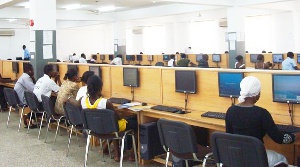The European Union (EU) would continue to strengthen educational collaboration with the African Union (AU) to empower the human resources for the continent's socio-economic development.
Mr William Hanna, the EU Ambassador to Ghana, said the EU partnership with Africa and collaboration together have real significance and real impact on the quality of what they do together.
He said Africa's Continental Education Strategy for 2016-2025 had similar targets to the EU's 2020 Education and Training.
"We have a mutual interest to collaborate and share our experiences, also through the work that is being done in the framework of the Joint Africa - EU Strategy on harmonisation of higher education," Mr Hanna said.
He was speaking at a two-day international symposium for Harmonisation Initiative and Third General Meeting of the Tuning Joint Africa-EU Strategy in Higher Education in Accra.
The two-day conference, which brought together 130 participants, was organised by the University of Ghana (AU) in collaboration with the Africa Union Commission (AUC) and the Association of African Universities, under the auspices of the EU.
The African Higher Education Harmonisation and Tuning Pilot initiative has been instrumental in addressing key areas of skills and competences for employability and transparency of curriculum, the development of a common academic credit currency, teaching, learning and assessment related to the achievement of learning outcomes, skills and competences, quality assurance and enhancement.
Mr Hanna said: "Higher education is developing an increasingly global dimension, as governments, institutions and students themselves are more and more aware of what is happening in other parts of the world.
"This institutional outlook is increasingly matched by closer cooperation across borders. But cooperation can only work when it is built on mutual trust - the very purpose of quality assurance," he added.
He said the EU wanted to enable highest education institutions to work with partners of the world, to modernise their education strategies and to empower them to respond to the challenges of globalisation.
"And to cooperate at all levels in order to overcome the barriers to mobility and recognition of qualifications both within Africa and with Europe," he said.
He said Tuning Africa had brought the students' voice into the harmonisation process and "not just as a formality as is often the case wherever you may be in the world, but concretely, with tasks assigned and a place in the group discussion”.
He said the EU was supporting the development of the Pan African Framework for Quality Assurance and Accreditation over the next three years.
"We know that higher education requires a solid framework, which builds on institutional, national and regional specificities and at the same time provides a common language and understanding of each other's systems to build up mutual trust and transparency," he said.
Dr Beatrice Njenga, the Head of Education Division, AUC, said the Division sought to contribute towards the revitalisation of quality, relevant, and harmonised education systems responsive to the needs of Africa, taking into account Africa’s aspirations and capacity in terms of human and material resources.
Professor Samuel Kwame Offei, the Pro-Vice-Chancellor, UG, called for better ways of educating and equipping Africa’s future leaders in order to safeguard the continent's socioeconomic development.
Diaspora News of Tuesday, 25 October 2016
Source: GNA

















